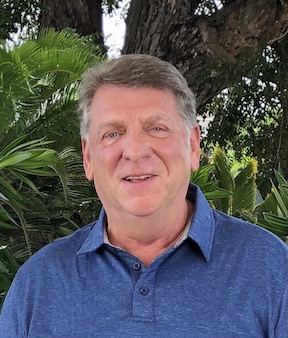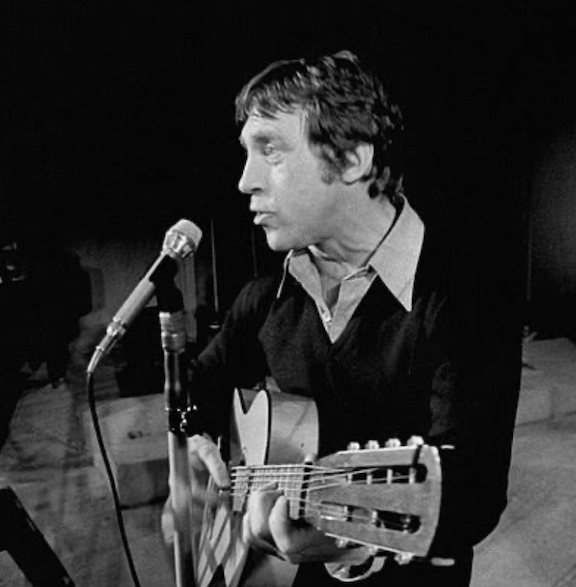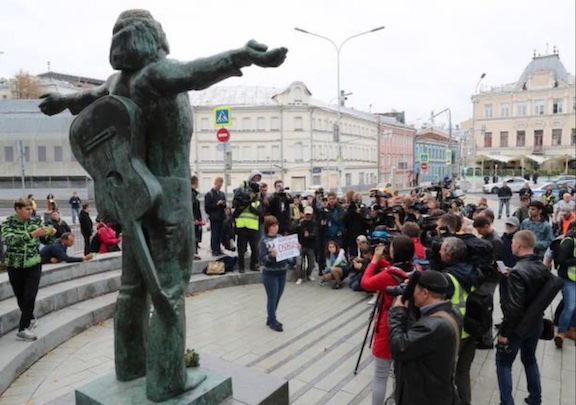By ALEXANDER DOLITSKY
I first arrived in America on February 1, 1978. An agent of the Immigration and Naturalization Services greeted me at the John F. Kennedy Airport in New York. He gave me $8, a small booklet titled Introduction to a New Life, a packet titled United States Refugee Program, and wished me “Good luck!” On that same day, I traveled to Philadelphia, where my new life began as an immigrant in America.
Three to four months later, a rumor went around among the Russian immigrant community in Philadelphia that Vladimir Vysotsky, a popular actor, poet and singer, would perform at the Doral Restaurant in the northeast part of the city. Tickets cost $10, which at that time was a substantial sum for newly arrived immigrants. But I scraped together the money for a ticket and went to the Vysotsky concert.
I knew Vysotsky’s songs well. Having been a student of the history faculty of Kiev Pedagogical Institute, I had participated in archeological expeditions and always listened with enthusiasm to his songs and often shared the experience with a small circle of friends while seated around a fire.
In the U.S.S.R., Vysotsky, an ideologically controversial character, was “the voice of the heart of a nation.” His wide-ranging and forthright poems and songs were considered subversive by the Soviet authorities, but they were the cultural lifeblood for many Russians, especially for young generation of the 1960s and 1970s.
Vysotsky is so unique that there are probably few like him worldwide. In some ways, however, his music and lyric resembles a combination of American performers—John Prine, Johnny Cash, Woody Guthrie and Bob Dylan, but in the context of Russian culture.
In a majority of cases, Vysotsky performed at factory concert halls or in other unassuming venues and in cultural clubs. It was practically impossible to attend one of his concerts in the former Soviet Union due to a high interest for his performance or security reasons engineered by the internal police.
In the spring of 1978, nearly 200 people, all Russian immigrants (approximately 300 immigrant families lived in Philadelphia in the 1970s), were crowded into the Doral Restaurant auditorium in northeast Philadelphia. Representatives of Soviet authority from the Russian Embassy in D.C. or from the nearest Russian Consulate were also present, standing in various corners of the hall and looking intently over the assembled crowd. Their mere presence evoked a feeling of caution, tension and fear borne of past years in the Soviet Union.
On the stage was a chair, and near this chair one of the concert organizers had placed a bottle of vodka with a highball glass. A short time later, Vysotsky quietly came on stage with his guitar and, without looking out over the attendees in the hall, sat on the chair and turned to the audience: “Please, do not send me notes with requests. I will sing only what I want or can sing.” The audience did not respond to these words; he began to perform, one song after another, without commentary and particular emotion. The concert lasted 40–50 minutes. Vysotsky did not drink the vodka.
My second, but at that time not personal, encounter with Vysotsky occurred in the summer of 1990, in Altay (mountains in Russia north of Mongolia) where, along with students of the history faculty of Krasnoyarsk University, I was conducting an archeological investigation of the Denisov Cave—a Late Paleolithic site dated approximately 20–25,000 years old. Academic Anatoliy Panteleyevich Derevyanko, on behalf of the Siberian Branch of the Academy of Sciences of the U.S.S.R., had invited me to Akademgorodok (a large scientific center in Western Siberia) in Novosibirsk for three months to participate in the archeological expedition in Altay.
By this time, I had already lived in America for 12 years and had become a naturalized U.S. citizen.
At the conclusion of the archaeological expedition, the students from Krasnoyarsk University with whom I had worked gifted me a book of Vladimir Vysotsky’s verses titled Klich (“call” or “summons”). The book was already quite worn and, it appeared, read many times by many people. On the first page of the book the students had written: “To our friend Alex from his Soviet student historians. Denisov Cave – ‘90’.”
Vysotsky died in Moscow in July of 1980 at the age of 42. Although he left behind a long and sad account of his last days under the influence of many drugs, he is fondly remembered by those who loved his lyrics and open-minded, pro-freedom songs.
These were my encounters and are my recollections regarding Vladimir Vysotsky, one of the instigators and pioneers of glasnost (“the opening”) in the former Soviet Union, that took place long before the Soviet Chairman of the Communist Party Mikhail Gorbachev’s socio-economic reforms in the mid-1980s.
Alexander B. Dolitsky was born and raised in Kiev in the former Soviet Union. He received an M.A. in history from Kiev Pedagogical Institute, Ukraine, in 1976; an M.A. in anthropology and archaeology from Brown University in 1983; and was enroled in the Ph.D. program in Anthropology at Bryn Mawr College from 1983 to 1985, where he was also a lecturer in the Russian Center. In the U.S.S.R., he was a social studies teacher for three years, and an archaeologist for five years for the Ukranian Academy of Sciences. In 1978, he settled in the United States. Dolitsky visited Alaska for the first time in 1981, while conducting field research for graduate school at Brown. He lived first in Sitka in 1985 and then settled in Juneau in 1986. From 1985 to 1987, he was a U.S. Forest Service archaeologist and social scientist. He was an Adjunct Assistant Professor of Russian Studies at the University of Alaska Southeast from 1985 to 1999; Social Studies Instructor at the Alyeska Central School, Alaska Department of Education from 1988 to 2006; and has been the Director of the Alaska-Siberia Research Center (see www.aksrc.homestead.com) from 1990 to present. He has conducted about 30 field studies in various areas of the former Soviet Union (including Siberia), Central Asia, South America, Eastern Europe and the United States (including Alaska). Dolitsky has been a lecturer on the World Discoverer, Spirit of Oceanus, andClipper Odyssey vessels in the Arctic and sub-Arctic regions. He was the Project Manager for the WWII Alaska-Siberia Lend Lease Memorial, which was erected in Fairbanks in 2006. He has published extensively in the fields of anthropology, history, archaeology, and ethnography. His more recent publications include Fairy Tales and Myths of the Bering Strait Chukchi, Ancient Tales of Kamchatka; Tales and Legends of the Yupik Eskimos of Siberia; Old Russia in Modern America: Russian Old Believers in Alaska; Allies in Wartime: The Alaska-Siberia Airway During WWII; Spirit of the Siberian Tiger: Folktales of the Russian Far East; Living Wisdom of the Far North: Tales and Legends from Chukotka and Alaska; Pipeline to Russia; The Alaska-Siberia Air Route in WWII; and Old Russia in Modern America: Living Traditions of the Russian Old Believers; Ancient Tales of Chukotka, and Ancient Tales of Kamchatka.
Read: Neo-Marxism and utopian Socialism in America
Read: Old believers preserving faith in the New World
Read: Duke Ellington and the effects of Cold War in Soviet Union on intellectual curiosity
Read: United we stand, divided we fall with race, ethnicity in America
Read: For American schools to succeed, they need this ingredient
Read: Nationalism in America, Alaska, around the world
Read: The case of the ‘delicious salad’
Read: White privilege is a troubling perspective
Read: Beware of activists who manipulate history for their own agenda



I have two neighbors who are Russian immigrants, both Naturalized citizens of the U.S. The agenda, events and cultural revolution promulgated by the far left “Progressives” in America are not new to my neighbors. They have seen this before in their country of origin: censorship, division of classes to create a unified class, the purging of cultural identity, media propaganda in collusion with government ideology, suppression of the free exchange of information and gulags. They are very worried.
P.S. The “like” button on this site doesn’t appear to be working . . .
It must be fascinating for you to watch America embrace everything you left behind.
Ohhhh, I can’t explain my feelings. And there is no place to go.
Mr. Dolitsky, you are exactly right, there will be no place to go to escape the strong arm of a totalitarian regime if we allow our Country to Falter.
It has always mystified me how my “leftist” friends could rail against the inequities of the USA and wish for a more equitable system (socialist) and yet not realize that they were living in a country with the most equitable system ever devised. A system that offered redress for real inequities because at it’s base it values individual liberty. That is the Beauty of America, thank you for reminding us with your columns.
To Robert: Thank you, Robert. I will elaborate on this subject in my next essay, tentatively titled “American Leftism….”. Suzanne will title my piece, as usual. I think, this is going to be my last essay. I cannot handle in writing on this subject anymore. God bless our country, liberty and freedom!
In January 2020 BC (Before COVID) the American economy was running like a well-oiled machine and enjoying growth rates not seen in years. Unemployment for black people was at all-time lows. Inflation remained a non-issue. And America had once again become energy independent, after decades of shortages and wars linked to her reliance on imported oil.
To look successful, all Joe Biden needed to do upon being handed the presidency was to emerge from his basement, fiddle with a few dials to look busy, and simply ride a post-COVID economic boom back to new heights. But, as Barack Obama might say: “Never underestimate Joe’s ability to fox things up.”
Vladimir Putin called former president Donald Trump an “extraordinary” and “talented individual,” but he categorized Biden as a political “career man.” Putin wasn’t wrong. Perhaps Biden sensed this, for his first acts after shuffling into the Oval Office were to spitefully revoke an array of Trump policies and executive orders, with no regard to their effects on his country’s well-being. Great plan, Joe!
So, now we have hordes of illegal invaders breaching the border in search of Biden freebies, while gasoline prices have risen to levels last seen when Biden was vice-president. And it seems that only a mild winter can save the country from a historic natural gas squeeze. Meanwhile, Americans are being conditioned for shortages of everything from food to semiconductors, while ships, trucks, and even the mail have become unreliable. This sudden distortion of markets and supply chains was not natural; it was caused by the government restrictions introduced under cover of the Wuhan virus, and it is made worse by the left-green mandates seen everywhere in the Reign of Greta.
But wait! There’s more! Candidate Biden portrayed COVID as Trump’s Black Plague, lamenting its victims with his utmost insincerity. Biden’s secret COVID plan once in power? More of the same failed antics: Mask worship and lockdowns, and mandated submission to the experimental vaccine. Now, forcing unvaccinated people out of their jobs, especially in fields facing labor and supply gaps, may seem both cruel and stupid. And maybe kicking them when they’re down by, say, depriving them of benefits or denying servicemen honorable discharges, might appear downright twisted. But not to Biden. In a “town hall” event, The Great Unifier quipped that 130-million unvaccinated citizens are claiming a right to “kill you.” Has dementia brought out Creepy Joe’s inner sociopath?
Other famous sociopaths include Russia’s Vladimir Lenin, whose Bolshevik regime also began with an assault on workers, gunning them down in the streets of St. Petersburg. Bolshevik soldiers secretly took former Czar Nicholas II and his wife, five children, and four servants and shot and bayoneted them to death, their bodies chopped up, soaked with acid, burned, and buried. A Bolshevik hate campaign against landowners and the “wealthy” then led to the murder of thousands and the starvation of millions. With farmland collectivized and much of the thinking population killed or in brutal work camps, Soviet citizens were underfed, undersupplied, and easy to control. For all but privileged communist party members, the Soviet Union between 1918 and the 1950s was a living hell. Or, as the New York Times reported it: an evolving workers’ paradise.
A compliant if unimaginative military and police force can also come in handy for aspiring dictators. So, they reshape those institutions in their own image, rather than face a repository of loyal patriots hesitant to break a few eggs to make the socialist omelet. Like Biden, Josef Stalin purged his military of competent officers, for fear their thoughts were not sufficiently progressive. Stalin’s new politically correct Soviet Army was then thoroughly spanked by a much smaller, more creative force after invading Finland in 1939. One can almost visualize a Soviet version of General Mark Milley licking Stalin’s boots, even while his troops were getting slaughtered in the snow.
“Build Back Better”? That is merely Biden’s awkward plagiarizing of the globalist Great Reset, which itself smells a lot like a blend of China’s Great Leap Forward and Cultural Revolution. Fabricate a crisis. Create shortages, inflation, and monetary chaos. Destabilize the heartland with alien cultures. Crush the middle class. Erase and invalidate history. Divide and demonize. Purge the police and military of patriots. Transfer wealth from the people to the Party and its useful idiots. Biden doesn’t want to Build Back Better. He wants to Build Back Bolshevik.
Let’s Go Brandon!
To Martin: Martin, it is so well written. Please submit this piece to Suzanne to be published as a separate essay in MRA.
Comments are closed.